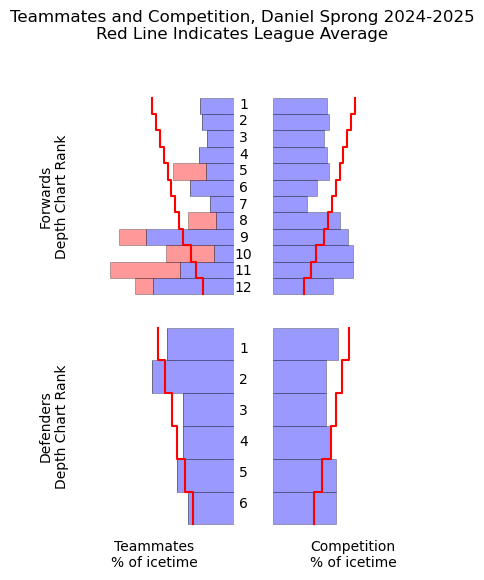The Daniel Sprong experiment lasted nine games.
On Friday, the Ā鶹“«Ć½Ó³»Canucks announced that Sprong had been traded to the Seattle Kraken for future considerations.
Sprong played parts of two seasons with the Kraken, scoring 21 goals for them in 66 games in the 2022-23 season. Now he returns to them at a time when they badly need scoring. They're currently ranked 21st in the NHL in goals per game and have a 5-8-1 record.
With the Canucks, Sprong scored a goal in his very first game, but didn't score another since. He finishes his time with the Canucks with 3 points in 9 games.
āWe would like to thank Daniel for his time here in Vancouver,ā said general manger Patrik Allvin in a statement. āWith his help our team has started the year in a positive way, and we wish him the best in Seattle.ā
It's a strange move for the Canucks, however, for multiple reasons.
The first reason is that the Canucks didn't get anything in return. "Future considerations" means that the Kraken will complete the trade at some point in the future by sending the Canucks a player, draft pick, or both. There can sometimes even be a performance-based clause in such a deal that determines the level of compensation.
What that usually amounts to is an AHL-level deal. Rarely does a "future consideration" actually impact a team at the NHL-level.
The question then is why would the Canucks bother trading Sprong at all?
Because the second reason it's a strange trade is that Sprong was on a cheap enough contract that he could have been placed on waivers and buried in the minors at no cap hit to the Canucks if he cleared. The maximum contract that can be buried in the minors this season is $1.15 million ā well above Sprong's $975,000 deal.
If Sprong had been claimed on waivers, then it wouldn't be much different from trading him for future considerations. If he cleared, he could work on the defensive side of his game in the AHL and be available to the Canucks in the future. We saw what happened in the playoffs last season when Brock Boeser had a blood clot issue and the Canucks suddenly didn't have any scoring wingers.
That raises a third reason why this trade is strange: Boeser's status is still unknown. From what I'm hearing, Boeser likely has a concussion from Tanner Jeannot's blindside hit to the head ā a hit for which he received a match penalty and a three-game suspension from the NHL. Until the Canucks know Boeser's timeline ā something that is often uncertain with concussions ā wouldn't it make more sense to keep a scoring winger like Sprong around?
All of that said, there are reasons why this does make sense for the Canucks.
One is that head coach Rick Tocchet likely wasn't satisfied with the steps Sprong was taking defensively. This is something he and Sprong discussed extensively prior to the season but it's entirely possible that Sprong's defensive habits ā or lack thereof ā are simply ingrained into him at this point. If Tocchet doesn't see those habits changing, he might not want Sprong as an option in the future.
Sprong was heavily sheltered by Tocchet. , he spent the lowest percentage of 5-on-5 ice time against elite competition of any Canucks player. That's clearly illustrated by his usage chart from HockeyViz: his ice time against top-six forwards was well below league average.
It's entirely possible that Tocchet didn't see that as sustainable. As a coach, he likes to be able to roll all four lines and have them comfortable playing against tough competition. With Sprong on the fourth line, that wasn't possible.
This also likely means that Dakota Joshua is ready to return to the lineup, meaning they'll still have a full complement of forwards. It's entirely likely that Joshua's return would have resulted in Sprong being a healthy scratch anyway.
Removing Sprong from the roster gives the Canucks a little bit more flexibility in terms of accruing cap space, as they can fill his spot on the roster with a player who is exempt from waivers, such as Arshdeep Bains, Max Sasson, or Linus Karlsson.
Also, Sprong, on his one-way contract, would be a very expensive AHLer if they waived him and sent him down. In terms of actual money spent, trading Sprong does save a bit of cash. It also removes a contract from their books: the Canucks were at 47 contracts out of a maximum of 50.
There's also the possibility that the Canucks were trying to do right by Sprong. If he wasn't going to stick with the Canucks, finding him a team that wanted him and he was already familiar with was likely a better option for Sprong than getting waived.
Finally, if Boeser does miss games, the Canucks do have a top prospect in the AHL who is proving to be a legitimate scoring winger for the Abbotsford Canucks: Jonathan LekkerimƤki. The 20-year-old Swede has 5 goals and 7 points in 7 games for Abbotsford and the Canucks might want to get a look at him at the NHL level.
While the trade and its timing is a little bit strange, there are reasons why the deal makes sense for the Canucks if they decided that Sprong wasn't right for their organization.




